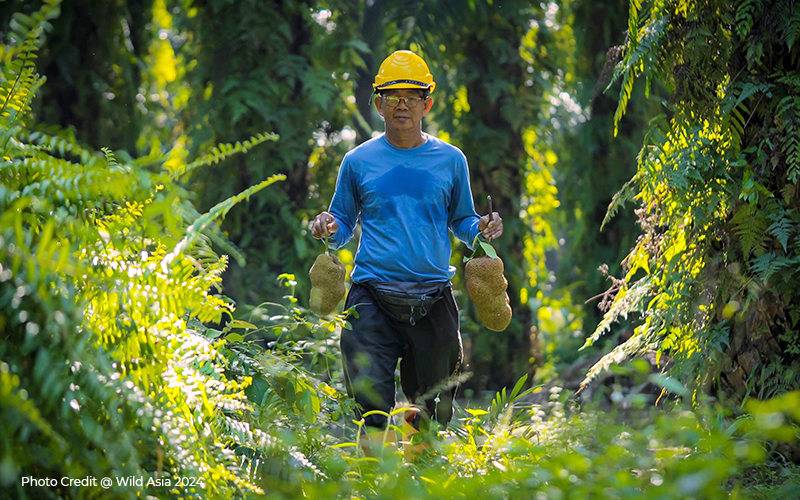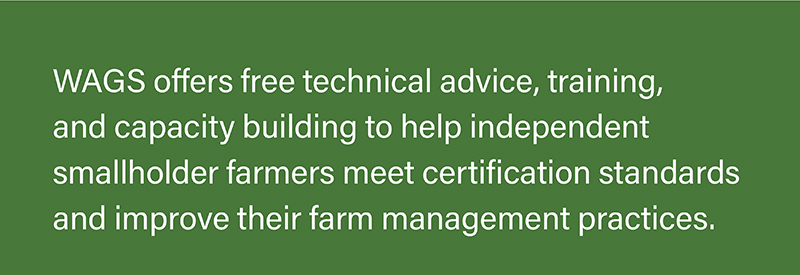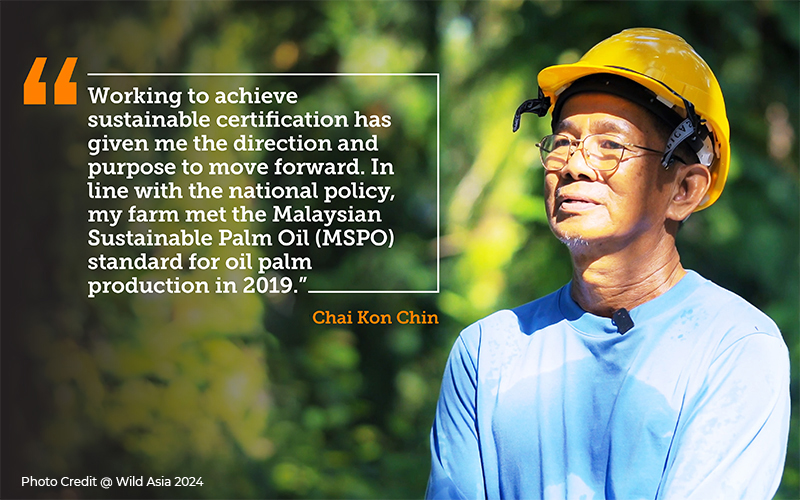A Smallholder's Sustainable Farming Chronicle: From Certification to Nature-Positive Farming
Independent smallholder Chai Kon Chin shares how he transformed his conventional oil palm farm into a nature-positive farm.

It's a scorching afternoon, typical of the tropical Malaysian climate, as Chai Kon Chin putters in his oil palm farm. He weeds out straggly shrubs and collects loose fruits scattered around the palm trees. Nearby, a flutter of butterflies hovers over a coral vine (Antigonon leptopus) bush with pretty pink flowers. Occasionally, two to three butterflies would land on Chai’s arm momentarily.
“It’s as if they’re chatting with me and keeping me company,” Chai chuckles. “Despite the midday sun, I’m comfortable because the lush greenery ‘cools’ my farm.”
We had dropped in to visit the independent smallholder’s 5.2ha farm located in the former mining town of Kampar, a two-hour drive north of Kuala Lumpur. In recent years, Chai has seen a surge of butterflies on his farm. His palm trees are healthy, with large, vibrant green fronds. His soil is rich, dark brown with crumbly textures, and teeming with worms. More importantly, the trees are disease- and pest-free.
Chai’s secret? He decided to let nature thrive, reduce chemicals, and adopt DIY organic fertilisers.
Early Years
Born and raised in Malim Nawar, Kampar District, Chai worked as a tractor driver in Kuala Lumpur after dropping out of school at 14.
“Life was hard! I was always on the road and barely making ends meet with a young family to support,” the 63-year-old reminisces. After his first child was born, Chai switched jobs to work for FELDA (The Federal Land Development Authority) in Kelantan as an oil palm estate mandor (foreman). His first exposure to conventional farming practices involved the liberal use of chemical fertilisers and pesticides.
By the time he hit his mid-forties, Chai was burned out and suffering from health issues.
“I returned to Kampar in 2009 and decided to plant oil palm,” says Chai, who still had to support his eldest daughter in university and two younger children in high school. “At least I can manage my time and stress levels and earn a stable income from oil palm.”
In the mid-80s, Chai’s father had leased this piece of land close to Kampar town and planted 40 rambutan trees (Nephelium lappaceum) for commercial production. Chai planted oil palm seedlings on the rest of the vacant land. Chai could apply the planting know-how he gained from working at FELDA, so it wasn’t a steep learning curve.
Yet, the early years were tough.
Chai was spending money on chemical fertilisers and herbicides every three to four months, and his farm operating costs were adding up fast. He tried selling his fresh fruit bunches (FFB) to different dealers but couldn't get a decent price or was sometimes short-changed.
Shift to Nature
The turning point arrived when Chai’s relative introduced him to Sg Kroh-based fruit dealer Teik Joo Chan (TJC). Not only did Chai finally get a fair price from TJC, but he also learned about Wild Asia through TJC. A progressive dealer who grasps the importance of embracing international certification standards, TJC has been working with Kuala Lumpur-based Wild Asia since 2013 to support the Wild Asia Group Scheme (WAGS) for its network of smallholders.

In order to meet sustainability standards, Chai had to learn and adopt standard oil palm good management practices, such as switching from blanket spraying to circle or selective spray and controlling weeds manually through slashing or grass cutting.
One of the Integrated Pest Management (IPM) strategies, also a sustainability certification requirement, is for farmers to reduce their dependence on chemicals for pest control. With guidance from the WAGS field staff, Chai planted beneficial flowering plants like coral vine (Antigonon leptopus) and senna (Cassia cobanensis). These plants become a food source and host plants for parasitoids like Sycanus, predators of bagworms - one of the most common and destructive pests of oil palm trees. The ‘conventional’ method to get rid of bagworms is to inject the trees with pesticides. However, long-term use of chemical pesticides can damage the tree roots and soil. Chai also kept grass as a ground cover to maintain moisture and deter the bagworms, which prefer dry conditions.
For other pests, like rhinoceros beetles, he adopts strategies like using pheromone traps. Since reducing his pesticide use, Chai has shaved his production costs by 40%.
Reaping the Rewards of Sustainable Farming
Today, Chai’s smallholding earns an average of RM5,000 a month, with an annual production of about 101 metric tonnes of FFB. Palm oil has helped Chai's three children through university, build their family home, and improve their living standards.
“When I started, I didn’t have a specific goal in my farming journey other than providing for my family,” says Chai. “Working to achieve sustainable certification has given me the direction and purpose to move forward.”
In line with the national policy, Chai's farm has met the Malaysian Sustainable Palm Oil (MSPO) standard for oil palm production since 2019 and international sustainable certification criteria.
For Chai, it means moving towards nature-friendly farming, connecting with the land and letting nature take its course, literally and figuratively.
It all began to come together for him when he took part in Wild Asia’s WAGS BIO awareness workshop. He learnt about WAGS BIO, an approach that helps farmers adopt nature-friendly agriculture practices. Farmers learn to restore or reinvigorate soil using organic matter from the farm or converting kitchen wastes into enzyme fertilisers. Healthy, microbe-rich soils lead to healthier palms resistant to pests and diseases and, ultimately, higher yields. Farmers are also taught the benefits of intercropping to improve soil and farm biodiversity.
Applying what he learned from the workshop, Chai made BIO juice (liquid enzyme fertiliser) using fruit peels that he collected from fruit sellers. He then sprayed the BIO juice on his palm trees, frond stacks, and soil.

“I usually apply chemical fertiliser after every third harvest. By replacing the commercial fertiliser with BIO juice, I saved up to RM3,000 for each application,” says Chai. “It took at least four months to see the effects (of the enzyme fertiliser), which is a modest yield increase. My trees and soil look healthier too.”
He also applies the BIO juice to his rambutan, jackfruit, and ciku (sapodilla) trees. Chai earns up to RM10,000 from rambutan sales on a good harvest year. He also sells sweet potatoes, which he grows on a separate 2-acre (0.8ha) plot, to supplement his income.
In a 2022 environmental survey conducted by Wild Asia on Chai’s farm, the data reveals a healthy insect population, notably butterfly species that include common palmfly (Elymnias hypermnestra), blue glassy tiger (Ideopsis vulgaris), peacock pansy (Junonia almana) and Psyche (Leptosia nina). Cutting back on chemical inputs has enhanced the biodiversity on his farm.
“I think the butterflies love being in an organic environment with no chemicals and dense vegetation,” Chai quips as he shows us a collection of butterfly images taken on the farm on his smartphone. Chai has yet to commit to 100% chemical-free farming but is not ruling out the possibility.
“It’s too labour intensive. For now, I just enjoy farming at my own pace and rhythm,” he says, smiling. I’m happy to be surrounded by butterflies in this serene ‘forest.’”
With that, he sent us on our way with a parting gift of two freshly harvested gigantic jackfruits and a bunch of cloyingly sweet ciku.
In Malaysia, 5.65 million hectares of land have been cultivated with oil palm (MPOB 2023). Independent smallholder farms like Chai Kon Chin’s (40.46ha of land or less) account for 14.5% (0.82Mha) of this planted area. As of 2023, there are 214,980 independent smallholders in Malaysia.

Article copyright @ Wild Asia 2024



